The coronavirus pandemic closed business school campuses and forced thousands of MBA students into studying online. But COVID-19 has also been a trigger for innovation. Some of the world’s most exciting startups have come out of the pandemic, and many of them have been started by MBAs.
In our MBA Startups To Look Out For | Coronavirus Special, we list the best coronavirus startups founded by MBAs this year, featuring students from business schools around the world, including INSEAD, Harvard, Stanford, and Cambridge Judge.
We’ve carefully selected some inspiring ventures for our MBA Startup Awards: Biggest Valuation, Health Innovation, Best Social Venture, and our BusinessBecause MBA Startup of 2021.
The startups on our list range in scope from cutting-edge healthtech companies to community support. On average, our MBA startup founders have seven years of work experience and scored 691 on the GMAT.
For all our winners, look out for a badge on the company photo below!
Harvard Business School—LivelyHood
National University of Singapore Business School—Dinda's Kitchen
London Business School—ShieldWear
Northwestern Kellogg—LifeWeb 360
Stanford Graduate School of Business—Gift Card Bank
Wharton Business School—Hello Ralphie
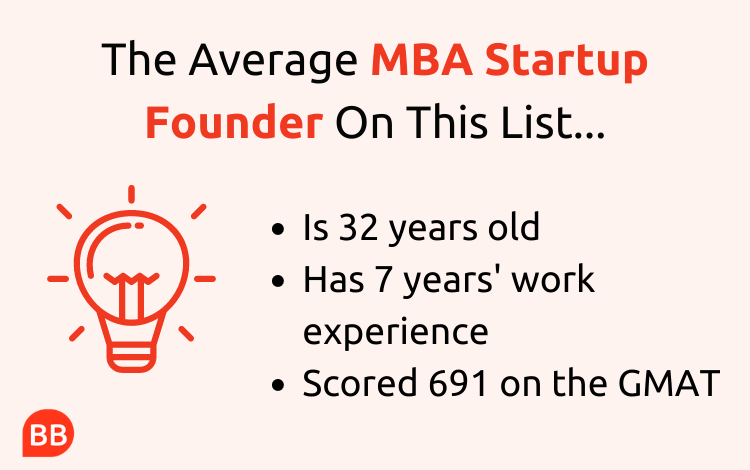
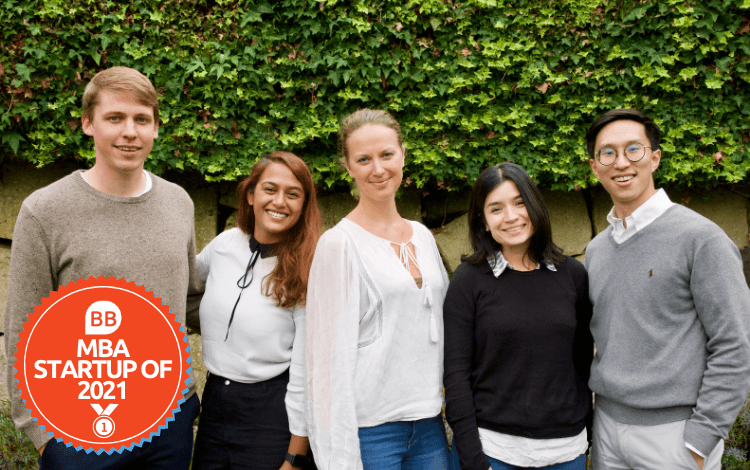
Who: Edward Tsim
School: INSEAD
Valuation: $3.9 million
Investment: $6,000
Q&A
What is your business, and what does it do?
Out of Office Spaces specializes in crafting bespoke hotel-based workspace solutions for professionals in metropolitan areas who cannot or don’t want to work from home, traditional offices or co-working spaces.
Today, our services offer a seamless, on-demand booking experience for hotel-based solo-working and meeting spaces in London.
How did the idea for your business come about?
The pain points of working from home became obvious during lockdown in France when we no longer were able to focus deeply or collaborate at school. My teammate, Anna, addressed these challenges by proposing to repurpose hotel spaces for office use.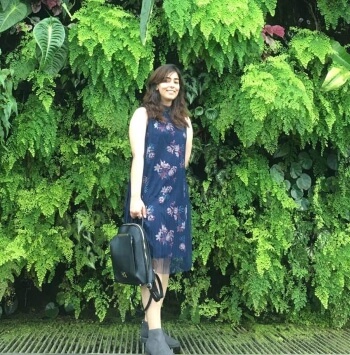
Hotels are conveniently located across cities and offer idle capacity during the daytime.
Professionals—especially those living in small studios or large house shares in metropolitan areas—often need to leave their house to conduct focused work in solo-workspaces or collaborate with teams or clients in meeting rooms that are located close to their residence.
How has your MBA helped you develop your business?
The venture sprouted from an ideation workshop during the INSEAD COVID-19 Innovation Competition, a student led initiative during lockdown to help channel MBAs’ energies into solving problems created by the pandemic.
The unique diversity of the INSEAD MBA greatly increased the ease of assembling a team with complementary skill sets and diverse background.
During and after the competition, the team benefitted from constant feedback from INSEAD Alumni, faculty members, and INSEAD Entrepreneurs in Residence. In addition, the founders were able to make use of what they learned in core subjects and strategically select electives that help their entrepreneurship journey.
Where are you with the business right now? What are your plans for the future?
In London, we have already established strong initial partnerships with hotel, incorporated our business and received paying customers.
In the future, we will expand our services to other areas (restaurants) and cities (Singapore). We are confident we have created a new market that will shape the future of workspace.
What are your tips for staying positive during the pandemic?
We believe it is incredibly important to focus on the aspects of live we can control and create small but meaningful routines.
Therefore, we are so excited to support so many professionals by offering an on-demand workspace whenever and wherever they should need to avoid distractions at home or meet with essential team members.
In addition, we also want to shape the way of working beyond COVID and love to immerse ourselves in strategizing of how we will be playing an important role in the future of work.
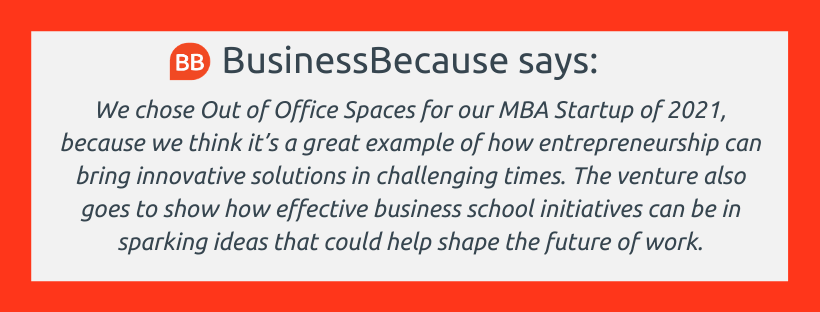
LivelyHood
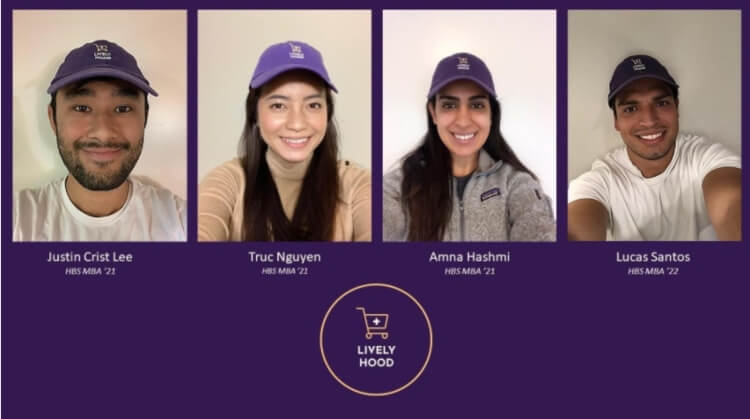
Who: Justin Lee
School: Harvard Business School
Valuation: TBC
Investment: No formal investment yet, but we've received a grant from Harvard University
Q&A
What is your business and what does it do?
LivelyHood is a Boston COVID-relief organization founded by Harvard graduate students. We have created a safe and simple platform that connects healthy volunteers with elderly and immunocompromised individuals who need help running errands. Today we partner with a number of local organizations to deliver food to members of the community in need.
How did the idea for your business come about?
It all started with a text thread amongst classmates after we were sent home at the start of spring break. We eagerly brainstormed ways for us to get involved and become a part of the solution to the myriad problems arising alongside the COVID-19 pandemic. LivelyHood helps those affected by the pandemic by mobilizing healthy volunteers to run errands for the vulnerable.
Where other similar services are manual, we’ve built a platform with a matching algorithm and text messaging integration to create an automated errand marketplace. For requesters: a fast and responsive service. For volunteers: a flexible, on-demand way to help others. We offer a technology-enabled solution to the entrenched problem of access.
We see COVID-19 as a phenomenon that is exacerbating underlying inequalities and inefficiencies in our social services infrastructure.
Where are you with the business right now? What are your plans for the future?
Right now we are working on gearing up for the current rise in COVID-19 cases and the winter ahead, iterating on our volunteer growth and engagement strategy, and figuring out where this might go after the current COVID-19 pandemic is over.
One thing is for sure, the end of COVID-19 will be good for us all. But beyond that, we believe we are meaningfully uncovering a need within our communities through LivelyHood.
Technology was promised to bring us closer together, but it hasn’t quite delivered on that promise. LivelyHood gives me hope that we can get closer to that vision.
How has your MBA helped you develop the business?
As a team, we are constantly calling upon the skills and learnings from our shared first-year MBA experience. When we submit grant proposals, we pull up our study materials from Finance and Entrepreneurial Management to create cumulative cash needs curves. When we sync up for growth hacking sessions, we talk about the frameworks and cases we discussed in Marketing.
And when we discuss our responsibilities to the community, we refer back to discussions from our Leadership and Ethics courses. It feels good to put our education to use, especially in a way that feels impactful during a time when so many of us feel disempowered and disenfranchised.
I’d be hard pressed to think of a better way to more immediately apply our MBA education and experience. It’s been very meaningful for us as a team.
What are your tips for staying positive during the pandemic?
Find ways to take care of yourself. This goes especially for our first responders (and our LivelyHood volunteers). If you don’t keep your cup full (or at least at a minimum viable level of full-ness), you will not have enough to give to others.
Dinda's Kitchen
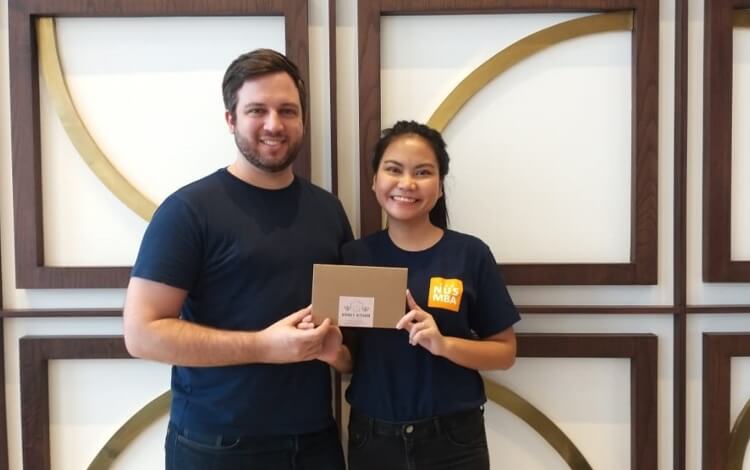
Who: Dinda Puspasari
School: National University of Singapore Business School
Valuation: Undisclosed
Investment: TBC
Q&A
What is your business and what does it do?
My company, Mallolas Group, is an Food and Beverage company focusing on restaurant management. I built the company in 2017 with a business partner, and currently the company owns and manages eight restaurants in Indonesia. Recently, due to the pandemic, we also offer bespoke catering services under the brand called “Dinda’s Kitchen”.
How did the idea for your business come about?
When all my restaurants suffered temporary closing due to COVID-19 lockdown, I saw an opportunity in serving catering for large companies in essential businesses, and that is how Dinda’s Kitchen was created.
There are two ways Dinda’s Kitchen helped those affected by the pandemic: First, it helped my employees to retain their jobs and maintain their salaries. The profit is donated to the underprivileged around Jakarta area. During Ramadhan (Islamic fasting month), I also made a fundraising and successfully provided more than 1,000 rice boxes for these underprivileged.
How has your MBA helped you develop the business?
The things I have learned in MBA program have shaped my mind to keep innovating despite of all the challenges thrown at my way.
For example, the things I learned in my Corporate Strategy class that made me think of trying out this Dinda’s Kitchen idea, or how to handle my employees with empathy during situation like this COVID-19 lockdown from my Leading with Impact class.
But overall, NUS MBA provided me with a lot of networks that can push me to take actions and the whole entrepreneurship community that keeps opening my eyes about a lot of opportunities. And for that, I am really thankful.
Where are you with the business right now? What are your plans for the future?
Currently Dinda’s Kitchen is a brand I use under my company for a kind of service that is still not addressed by other brands I have in my company’s portfolio.
We always want to grow, so if in the future the financials make sense, then we might make this brand as a new entity.
What are your tips for staying positive during the pandemic?
Take time for yourself, do not be in a rush. It is okay to feel down sometimes, but when that happens, please use your time to do things that you love outside of work.
Prioritize health, physically and mentally, over anything else. You will not make a good decision if you are over-stressed. Talk to families, friends, and loved ones often so you don’t need to feel like you carry the weight all by yourself.
ShieldWear
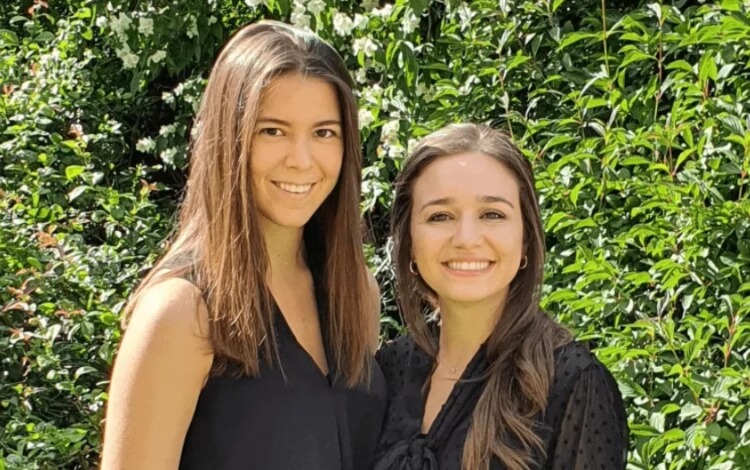
Who: Jayne Lawson and Claire Blumenthal
School: London Business School
Valuation: Not disclosed
Investment: TBC
Q&A
What is your business and what does it do?
ShieldWear provides care homes and corporates with a reliable, dependable and cost-effective supply of personal protective equipment (PPE) and facemasks.
How did the idea for your business come about?
I was in the final semester of my MBA at London Business School when the pandemic started. I decided to take on a project to help a care home source PPE. Whilst doing so, I became frustrated by the lack of professionalism, care and diligence in the PPE industry.
I encountered unreasonable markup prices, uncertified and fraudulent products, lack of on the ground stock and questionable supply chains. I was eager to find and supply high-quality PPE at modest prices, with fast delivery times, for those in need.
How has the MBA helped you develop the business?
The LBS community were fantastic in getting the ShieldWear name to the businesses and care homes in need of our product.
Furthermore, many of my LBS peers have been eager to lend a hand or advise in areas in which they have expertise. For example, one Chinese classmate enthusiastically assisted us in our due diligence process by conducting on-the-ground research into the manufacturers we partnered with. Furthermore, we hired four MBAs to help with sales, logistics, operations and marketing.
The courses at LBS were incredibly valuable, providing multiple frameworks that helped shape ShieldWear’s business model.
Where are you with the business right now? What are your plans for the future?
I now lead ShieldWear with a team of former business school students and alumni along with experienced professionals across cities in the UK, France and Switzerland.
The team is a product of COVID-19, having been recruited during lockdown through video calls and we work together to continue to expand into new markets and supply an ever expanding catalogue of reliable, certified, and cost-effective PPE to care homes and corporates in need.
What are your tips for staying positive during the pandemic?
Starting up ShieldWear during the lockdown has certainly given me plenty to do and there hasn’t been a quiet moment! Nevertheless, it has certainly been good for me to try
to go on walks every day, make sure I take time away from my laptop (especially at mealtimes) and set aside time to FaceTime or meet with a friend. Adapting to find ways to do the things you enjoy (even if you have to adjust to doing them virtually) is key!
Go to page two for MBA startups from top schools like Duke Fuqua and IMD
IMDMy Health Diary

Who: Herman Huang
School: IMD
Valuation: $10 million
Investment: $1 million
Q&A
What is your business and what does it do?
My Health Diary is a health tech currently serving Indonesia market and in the future targeting other Asian countries as well.
Our vision is to realize Precision Medicine concept and by doing so we can improve the quality and efficacy of the healthcare sector and reducing the cost. The apps based on SaaS model in which we help B2B (hospitals,clinics and etc) and also B2C (individual users) to digitalize their medical services, medical record, connecting their operations into our app system and make better informed curative efforts by monitoring health condition of patients over a meaningful time period.
We put into the apps AI capability for automatic early advise and also to analyze big data. We also integrate wearables as IOT input to the apps for individual tracking of vital signs.
How did the idea for your business come about?
We were very concerned about the condition of healthcare in Indonesia and other Asian countries.
The quality of healthcare services varies widely from cities to villages, public confusion due to various misinformation spreading around, and ever increasing cost of healthcare but this coupled further with lower efficacy on medical treatments given.
We believe everybody deserves to be healthy and get the best treatment possible, especially with the availability of technologies such as AI and Telemedicine.
We decided then in late 2018 to create a new type of healthtech app to give back to society and transforming lives in the long run.
Since March 2020,we created specific COVID-19 Features such as chatbot to diagnose whether users are likely to contract coronavirus, informational webinars about the virus, and supporting regional governments in Indonesia with their track and trace efforts.
How has the MBA helped you develop the business?
The MBA from IMD back in 2012 clearly helped me a lot by giving me the useful tools and knowledge pertaining to management and innovation. It also opened up a lot of doors that otherwise won’t be so easy to open.
One more trait I would like to highlight from IMD’s MBA is the leadership skills which equipped me to know myself and to be tactical, but also humble in my entrepreneurship journey.
Where are you with the business right now? What are your plans for the future?
Our efforts to counter the effects of coronavirus have been widely recognized and we were selected as the winner of Digital Challenges from Asian Development Bank for “Restoring Public Confidence in Travelling,” back in September 2020.
ADB is giving us grant and other assistances to spread the usage of our apps in Indonesia and other Asian countries.
At the moment, my plan is to keep doing innovative business and apps across Asian Region and giving the impact back to the society at the same time.
What are your tips for staying positive during the pandemic?
I keep myself busy and make sure I give positive contribution towards the handling of Pandemic in my society.
I believe various phenomenon in our live is temporary and everything that come shall pass too.
Duke FuquaDoctor's Choice

Who: Yahya Remtulla
School: Duke University Fuqua School of Business
Valuation: TBC
Investment: TBC
Q&A
What is your business and what does it do?
We are on a mission to make hospital-used UVC light accessible for all.
We have created a large, portable UV sanitizer box to disinfect commonly-used and highly touched items, like your phone, keys and wallet, in a safe manner. This will keep us all safer during the pandemic and beyond.
How did the idea for your business come about?
Back in April, when the mandatory quarantine was lifted, very few people were taking precautions around catching COVID-19 from personal items.
It is common knowledge that germs, including COVID-19, can live on surfaces for days and act as the cause of sickness. When researching solutions to this problem, I came across UVC light.
The technology breaks apart the DNA/RNA of any germ and has been used in hospitals for years. I felt that this technology needed to be available to everyone. That’s what I set out to do: prevent people from getting COVID-19 from their personal items.
How has the MBA helped you develop the business?
I could literally spend an hour relaying how my MBA has helped me develop my business. The professors, course material and experiential learning opportunities at Fuqua have been invaluable.
Most notably, my MBA experience has taught me how to identify and quantify business opportunities, and to develop a strategic activity network, to keep the business differentiated.
In addition, I have learned to build a brand by focusing on developing strong, positive associative networks, to understand our customers deeply, to segment our markets and to tailor our messaging to connect with them seamlessly.
Where are you with the business right now? What are your plans for the future?
We successfully launched on Amazon in August, having great success. We have also launched our website, Doctor’s Choice UV Sterilizer, and are taking orders right now! Our future plans are to create tailored solutions for post COVID-19 customer segments, like immunocompromised children, as well as developing new solutions, such as UVC air purification systems.
What are your tips for staying positive during the pandemic?
Apart from watching re-runs of The Office, I would say to keep perspective.
If you are safe, healthy and surrounded by loved ones, know that there are many people who would love to be in your position. Also, the year 2020 will make the history books.
We will talk to our children and grandchildren about living through a pandemic, social activism, and the most polarizing election ever. Live in the moment and create memories. Remember, you can be that cool grandparent with stories your grandkids want to listen to during the holidays!
UCLA AndersonAmptron Medical

Who: Nirav Patel
School: UCLA Anderson School of Management
Valuation: Not disclosed
Investment: Capital raising planned for 2021
Q&A
What is your business, and what does it do?
Amptron Medical is developing a neonatal bridge ventilator—SimpliVent.
The product provides safe and effective respiratory support to treat mild to moderate levels of respiratory illness in neonates.
SimpliVent is a low-cost respiratory care alternate for saving lives. SimpliVent bridge ventilator uses an existing FDA-approved ventilation therapy to deliver oxygen to a subset of patients suffering from respiratory disease.
How did the idea for your business come about?
The COVID-19 pandemic has highlighted gaps in our healthcare system.
In fact, we were conducting business research on the need for low-cost ventilators in resource-limited environments mid-2019, before the pandemic erupted.
When the pandemic hit, major respiratory makers and auto manufacturers scaled up ventilator manufacturing. During the crisis, hospitals were repurposing their neonatal ventilators for COVID patients, leaving vulnerable lives at risk.
We identified a niche market of neonatal respiratory care, and focused our efforts on developing a product solution that fills that market gap. SimpliVent, in the short term, will mitigate the COVID-19 crisis by freeing up ventilators for COVID patients.
In the long term, SimpliVent will serve the respiratory needs of neonatal and pediatric patients. It is a low-cost respiratory care alternate for saving lives in developing countries as well.
How has your MBA helped you develop your business?
UCLA Anderson helped me bridge the gap between my engineering background and entrepreneurship.
My experience in engineering medical products has taught me how to convert an idea into a product, and an MBA education has helped me transform a product into a business. The highlight of my MBA experience was taking our early-stage startup through the Anderson Venture Accelerator’s summer Activate program. We connected what we learned in our coursework and applied it to form a solid foundation for the business.
What are your tips for staying positive during the pandemic?
The COVID-19 pandemic led to the closure of many businesses, but it has also opened up several new commercial opportunities that never existed before.
It is a matter of identifying the opportunities and developing solutions and enterprises to fulfill them. So, the advice I’d give to future entrepreneurs is to keep looking and think outside of the box. Like Steve Jobs said, “Stay hungry, stay foolish!”
Horaizon

Who: William Mitchell and Nate Koweda
School: Cornell, Johnson Graduate School of Management
Valuation: TBC
Investment: Not disclosed
Q&A
What is your business and what does it do?
Horaizon allows remote teams to collaborate with the same set of natural behaviors they do in the office.
Users simply speak to their colleagues about whatever comes to mind, and are connected in real time. And we display lightweight avatars on the screen to represent what’s happening in the office including who’s talking to who, and breaks.
This way, you can make the casual comment or ask a question no problem. You can do all of that in Horaizon, as easily as in a physical office.
How did the idea for your business come about?
In the first several weeks of our MBA program, we were driving to and from school and discussing remote work as an idea—why with all its obvious benefits for workers and businesses it wasn’t more widespread.
We concluded that existing technologies were built for co-located teams that had the occasional out of office employee, rather than coming from a fully remote paradigm.
Because we make available the same natural behaviors by which teams collaborate when co-located in the remote space, we help businesses & workers alike experience the best of both worlds, co-located and remote.
How has the MBA helped you develop the business?
Johnson Cornell Tech’s curriculum taught us to think about the holistic environment that startups operate in, and particularly how to use technology to serve users while avoiding the trap of force fitting users to technology.
Where are you with the business right now? What are your plans for the future?
We’re alpha testing right now. This early user feedback will help us determine where to put our focus as a we develop a scalable beta and look to fundraise.
What are your tips for staying positive during the pandemic?
Early on, we, along with some other classmates, made an effort to keep people involved through a mix of social activities and coffee chats.
The most important thing was to give different people the chance to lead. Taking an active part in doing something for others is a sure way to feel good.
Localing
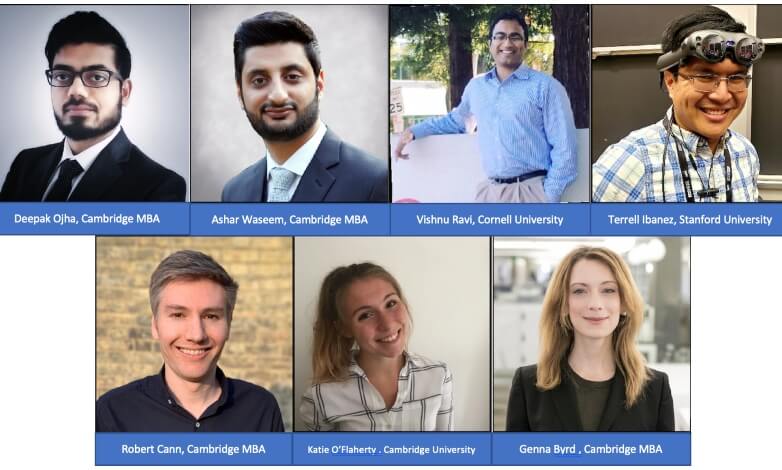
Who: Deepak Ojha
School: Cambridge University Judge Business School
Valuation: TBC
Investment: TBC
Q&A
What is your business and what does it do?
Localing is a social venture aiming to provide digital capabilities to local businesses. Every local store will have its storefront, where they can sell their products and services and offer local deals.
For customers, it would serve as their local e-marketplace, aggregating product, and service providers in their area.
We provide a platform for businesses to reach local customers through digital sales and marketing channels. Businesses advertise package deals and discounts, exclusively available and easily purchasable at Localing by local members of the community.
These deals can be redeemed in-store at the customer's convenience, not only leading to greater sales volumes through secondary purchases but also increasing customer stickiness through the Localing loyalty point scheme.
How did the idea for your business come about?
We came up with this idea during the Cam v/s Covid hackathon organised by the Cambridge Hack Foundation in May 2020.
A lot of businesses at that time were under financial stress given the lockdown. Digging deep into the problem made us realize that the pandemic has just accelerated the downfall of small and micro-businesses, which were already struggling to compete with global e-commerce giants.
The basic skeleton of our business was created during the three-day hackathon, which we eventually won. After the hackathon, we received encouragement from leaders of local councils around Cambridge, and we decided to take Localing forward.
How has your MBA helped you develop your business?
My MBA greatly helped in realizing the idea of Localing.
Firstly, the core concepts taught in Entrepreneurship, Marketing, and Strategy courses helped us build a strong value proposition in the first place, which helped us win the hackathon competing against some well-established teams. This knowledge is also helping us create an appropriate strategy for launch, customer
attraction, conversion, and retention, or creating the equity structure of the company.
Secondly, the MBA helped us connect with people who helped us through our journey. From professors to mentors who guided us at every step, everyone has a Cambridge Judge Business School connection.
Where are you with the business right now? What are your plans for the future?
We are currently finishing our product development. With no open-source multi-vendor e-commerce platforms available, we had started from scratch, from our landing page, to the AI capabilities.
We aim to finish the product and launch by mid-January 2021 (maybe earlier), just before we start our journey at the Accelerate Cambridge programme.
What are your tips for staying positive during the pandemic?
I can share two tips here:
We live in a fast-paced world where most of us are racing towards something or the other. This pandemic has slowed down the world and has allowed us to self-reflect, work on things that have been ignored all along, it could be a hobby, a relationship, or a new skill for the future.
Set up small goals for yourself, something independent of external forces. Accomplishing these goals would give you a constant sense of achievement, which is necessary in these times to keep the fighting spirit high.
Read on to page three for more exciting startups from schools like Kellogg and Stanford
Oxford SaïdOxford MedEx
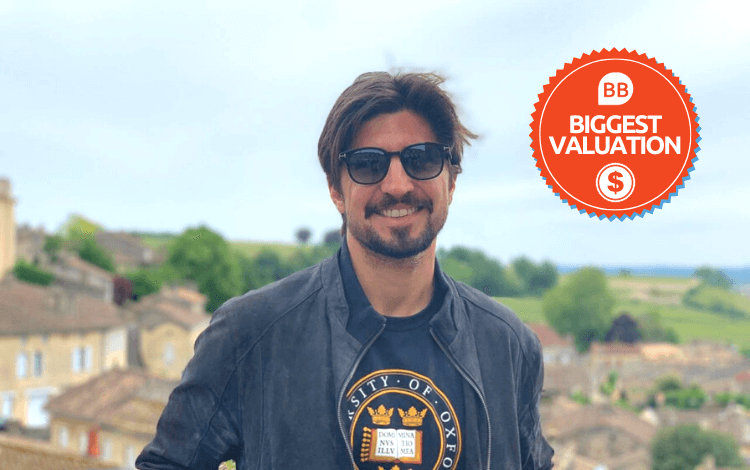
Who: Shahrez Khan
School: University of Oxford Saïd Business School
Valuation: $40 million
Investment: None
Q&A
What is your business and what does it do?
Oxford MedEx supplies PPE to healthcare services and hospitals in the United States, Australia, Canada and Singapore.
We delivered five million items of PPE to the United States and signed a $12 million deal with Canada Health, Canada’s health service.
How did the idea for your business come about?
At the height of the COVID-19 crisis, I heard harrowing first-hand accounts of frontline hospital staff in the UK struggling to treat patients without adequate PPE from my uncle, a surgeon who runs an NHS hospital.
Realising I had the network, supply-chain, skills and staff to help, I created Oxford MedEx specifically to provide PPE to hospitals in need.
How has your EMBA helped you develop your business?
I had to draw on the lessons from the Executive MBA, which taught me to be agile and adapt to the changing business environment.
I also utilised the Oxford network to reach out to hospitals and state procurement departments that were struggling to maintain PPE supplies.
Where are you with the business right now? What are your plans for the future?
In the short term I believe demand for PPE will remain high. However our long term aim is to now supply our other range of healthcare products—patient gowns, hospital sheets, scrubs and so on.
We want to be a key player in the global healthcare industry.
What are your tips for staying positive during the pandemic?
Spend time with family and stay connected with friends. Exercise regularly. Running and working out at the gym has really helped me to stay positive.
Hiking and the outdoors. I spent the last summer in the mountains. Absolutely loved going for hiking every day. The outdoors and regular trekking really helped me stay positive.
Spot opportunities as the pandemic uproots certain industries and serves as a catalyst for growth in others. Have conviction and belief that there is light at the end of the tunnel as the world comes closer to creating a vaccine
LifeWeb 360
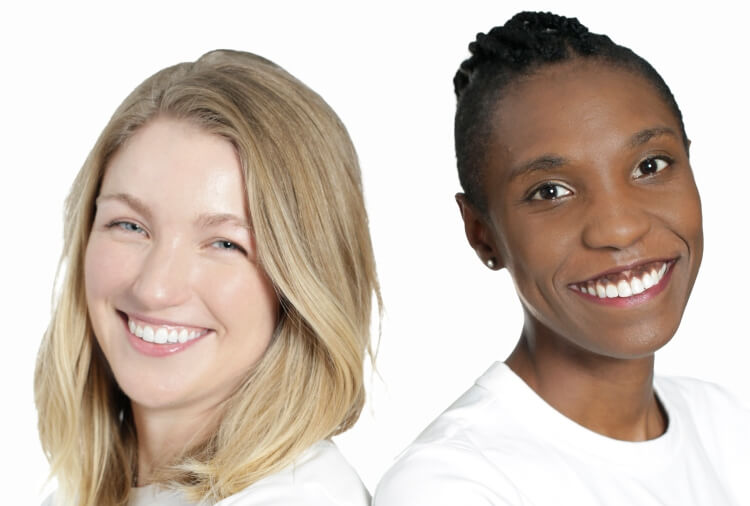
Who: Ali Briggs and Rachele Louis
School: Northwestern University Kellogg School of Management
Valuation: TBC
Investment: Not disclosed
Q&A
What is your business and what does it do?
LifeWeb 360 helps communities who have lost a loved one or have someone at the end of their life to capture memories and support one another. Friends and family can share stories, photos, and videos that are organized to create context and meaning, and can also be turned into a physical memory book.
How did the idea for your business come about?
We’re here because of our friend Josh who lost his older brother, Seth, in an apartment fire over 10 years ago.
They had a big age gap, so while he remembers his brother as an older figure in his life, he only knows him as a peer from the memories shared by his brother's friends. Josh shared how terrified he was of losing touch with these friends and the memories of his brother that live on through them, so we built LifeWeb 360 to preserve memories and to preserve community.
With social distancing, it’s difficult for communities to come together in person after someone dies to show their love and support for a bereaved family.
LifeWeb 360 has found a home with people looking for new ways to honor their person in what amounts to an extension of the wake, a place for capturing the stories of all the people that knew the person in different ways, even if they are scattered around the world.
Additionally, as social distancing rules continue to evolve, having a central spot to easily organize memorial events and communicate changes is critical.
Finally, our users can opt into reminders on important dates to check in with the family, which is more important during social distancing and isolation than ever.
How has your MBA helped you develop your business?
The kernel of what became LifeWeb 360 started in an entrepreneurship class at Kellogg about customer discovery and human-centered design.
Because of this, we got off on the right foot with things like focusing on a problem, not a solution, getting out of the (very nice and shiny) business school building and talking to people with that problem, and testing and iterating like crazy in a scrappy way. Our Kellogg professors and classmates continue to cheer us on and support us today as advisors, customers, and friends.
Where are you with the business right now? What are your plans for the future?
We are growing quickly as communities proactively seek out new ways to support people in their life who are grieving amidst the pandemic.
We are hiring to continue our never-ending journey to improve our product experience for our community, and we’re excited about new partnerships we’re building (and are very open to new ones; reach out!)
What are your tips for staying positive during the pandemic?
Give yourself permission to be stressed out some days, play hide & seek in your quarantine home, have a teammate DJ your virtual team meetings, focus on caring for others, and pick up a new hobby (don’t forget about your local library— the LifeWeb 360 team is loving checking out different cookbooks each week!).
And, when all else fails, there is always videos of babies tasting lemons on YouTube!
Gift Card Bank
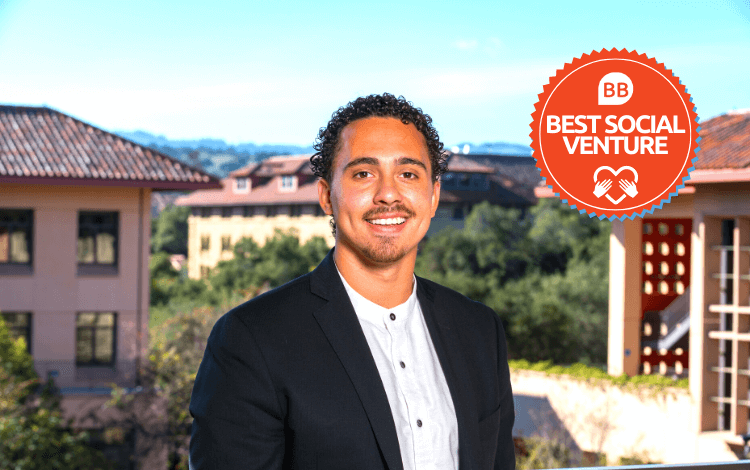
Who: Khalil Fuller
School: Stanford Graduate School of Business
Valuation: N/A
Investment: $325k raised at time of writing
Q&A
What is your business and what does it do?
Our mission is to improve well-being and financial security by supporting people through their time of greatest need.
Gift Card Bank is a scalable, secure platform that aggregates digital gift cards for essentials and distributes them to low-income families in need.
How did the idea for your business come about?
The idea for Gift Card Bank came to me after working with food banks in the Spring. They had been hit with a double-edged sword of rapidly increased demand while their volunteer bases were reduced due to social distancing.
Gift cards are a novel way to use technology to ensure food access for vulnerable families. We help people like Shannon in Houston:
“Last month, I actually ran out of food stamps and didn’t have anything left for groceries. Thanks to your gift, I was able to buy food for the week. I am truly grateful. Thank you.”
How has your MBA helped you develop your business?
Stanford GSB has an emphasis on interdisciplinary learning, because truly great businesses come from blending insights and expertise from multiple different arenas.
Gift Card Bank is a prime example: My background is in scaling innovative nonprofits, and my founding team of GSB students have worked in fintech, supply chain optimization, and technology development.
The MBA experience taught us the importance of moving quickly when an entrepreneurial opportunity presents itself, and building a company that constantly runs experiments.
We created the MVP for Gift Card Bank in less than four days, and have iterated constantly with ongoing feedback from the market.
Where are you with the business right now? What are your plans for the future?
After a summer of successful pilots with top tier grocers and food banks, we are ready for scale. We’ve proven that the Gift Card Bank platform can distribute support efficiently, and we plan to grow to $1.5 million in gift card value and help 25,000 families next year.
What are your tips for staying positive during the pandemic?
Like most people, I’ve struggled to maintain strong mental health at points throughout the year. Something that has helped me emotionally is a gratitude journal.
I know it may sound so cliche, but taking a few moments to pause and think about the things I appreciate helps put the rest of life into perspective.
Try writing down:
A person you’re grateful for. Bonus good vibes if you text them a quick “thinking about how much you mean to me” message
Something in your visual field that brings joy. Can be a flower, the light through a window, or even the texture of a rug.
An opportunity you have that you should not take for granted.
WhartonHello Ralphie
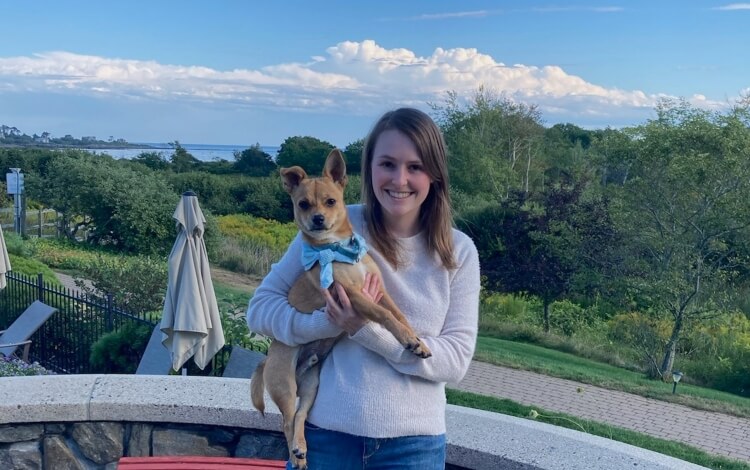
Who: Felicity Johnson
School: Wharton
Valuation: N/A
Investment: $635k
Q&A
What is your business and what does it do?
HelloRalphie is a marketplace that connects pet parents with veterinarians for video and chat appointments.
How did the idea for your business come about?
While working in New York, Felicity’s cat, Tiffany, was diagnosed with cancer.
Felicity struggled with managing Tiffany’s veterinary care appointments, which were always scheduled for the middle of the day, and her full-time job. She often took time off of work to bring Tiffany to the vet because the option for a virtual appointment didn't exist.
During COVID, pet parents and vets have sought out solutions for socially distant appointments. For parents who don’t wish to participate in curbside drop off and for vets who may be at higher risk, HelloRalphie has been the perfect solution.
How has your MBA helped you develop your business?
HelloRalphie (formerly My Virtual Veterinarian) won the 2020 Penn Wharton Entrepreneurship Challenge, rewarding us $30K in cash and $15K in in-kind services.
Wharton’s Venture Lab is incredibly helpful with promoting HelloRalphie through LinkedIn and the Wharton Magazine.
The Wharton network helps me daily—whether it’s finding experts for advice, or reaching out to potential partners.
Where are you with the business right now? What are your plans for the future?
The platform has generated over $70K in gross revenue, of which ~$20K is net to HelloRalphie.
We have over 2600 users and our conversion is 25%. We are building a white-label platform for partners to offer virtual veterinary care to their clients within their ecosystem.
What are your tips for staying positive during the pandemic?
Honestly, I love what I’m working on and am motivated by my desire to help more pets access veterinary care.
I spend much of my free time walking and playing with my 11-month old puppy, Ralph, who brings me a lot of joy.
METHODOLOGY
For our coronavirus startups list, we reached out to the world’s top 25 business schools as ranked by the Financial Times in 2020. We requested nominations for one startup per school which was launched by an MBA graduate, and is helping those affected by coronavirus. We’ve only featured schools who responded and nominated a relevant startup.
All values such as valuations and investment are to date and were reported to us by the founders themselves. When a confirmed value is forthcoming, it is noted as TBC in this list. For startups where valuation is not applicable, for instance in the case of nonprofits, this has been market N/A.
This feature was put together by the BusinessBecause editorial team: Bethany Garner, Simon Lovick, Thomas Nugent, and Joy Hunter.


